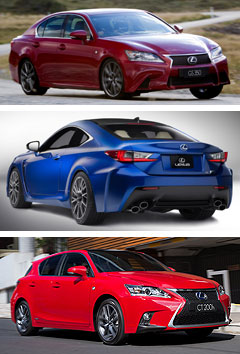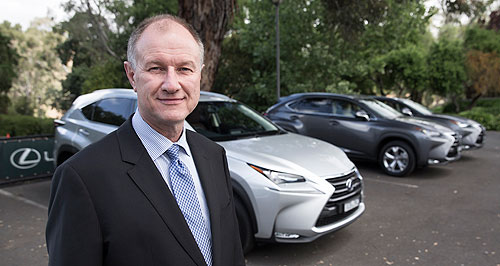Make / Model Search
News - LexusLexus looks down to go up in luxury car salesOn the up: Lexus Australia CEO Sean Hanley with the new NX 300h that will give Lexus its first weapon in the fast-growth luxury compact SUV market segment. ‘Step-up’ buyers to drive Lexus to next level as it moves beyond hybrid focus28 Oct 2014 AFTER treading water for several years in the Australian luxury car market, Lexus is throwing off the sales shackles by tackling its mainly German rivals in the burgeoning lower end of the prestige car segment. At the same time, it is also set to go after the glamour sports luxury market with a brace of high-performance models under its F banner, potentially including potent turbo-charged four-cylinder bitumen burners alongside at least two V8 beasts, starting with the new 330kW RC F coupe from early next year. “We are just getting started,” Lexus Australia CEO Sean Hanley promised when launching the new diamond-cut NX – Lexus’ first entrant in that fast-growing luxury compact SUV category – in Adelaide this week. To emphasise the point, Mr Hanley also announced the appointment of four new dealerships – two in New South Wales and two in Queensland – to help cater for expected growth in regions not renowned for luxury car sales, such as western Sydney. Despite a heavy dependency on its conservative petrol-electric hybrid models over the past decade, most of the Lexus growth is set to come from vehicles powered by its all-new, long-overdue turbo four-cylinder petrol engine that is destined to be spread across several models including the top-selling mid-size IS and slow-selling large GS, in which it will replace the ageing 2.5-litre V6. The four-cylinder engine will make its Australian debut in February next year in the new Lexus NX compact SUV that was launched in hybrid NX 300h form in Australia this week. The NX marks what Lexus Australia hopes will be a turning point in the fortunes of Toyota’s luxury brand, which to date has not had the models to take advantage of a surge of buyers stepping up from mainstream marques to prestige badges over the past few years. Since peaking at a company record 8199 sales in 2008, Lexus Australia’s annual sales volume has hovered between 6000 and 7000 units, mainly held together by the IS mid-sized sedan and RX large SUV. This year, sales are expected to edge past 7000 for the first time in seven years, thanks to a couple of months of NX 300h deliveries, before getting a proper move on next year with the arrival of the mass-selling four-cylinder NX 200t and swoopy RC coupe that is set to take on the BMW 4 Series and Audi A5, among others. Mr Hanley said his company was targeting five to 10 per cent sales growth a year over the next decade, with most of it coming from what he describes as “step-up buyers” – those moving up from mainstream marques to luxury brands. He predicts the NX will become one of Lexus’ top-three sellers within 12 months, with the new petrol turbo four-cylinder engine accounting for 60 per cent of the volume. So far, more than 80 per cent of the 300 pre-launch NX purchases have been conquest sales – buyers who previously owned another brand of vehicle – which Mr Hanley said augurs well for Lexus growth. Last year, the latest IS – a rival for the BMW 3 Series and Mercedes-Benz C-Class – topped Lexus sales with 2843 sales. If the NX can match that, it single-handedly will boost Lexus volume by up to 40 per cent, with the IS-based two-door RC adding a layer of cream on top. As well, Lexus is secretly planning to graft the new 175kW/349Nm four-cylinder engine into its IS sedan as a replacement for the 2.5-litre V6. Called IS 200t, the new variant will give the sedan much needed ammunition against the similarly powered 3 Series and C-Class while at the same time potentially lowering the IS entry price below the current $56,500 IS 250 starting point. In the longer term, the lacklustre CT hybrid small hatch that is averaging only about 50 sales a month this year is likely to get the four-cylinder turbo engine too at the next full model change in about two years, finally helping it to reach its potential and put a dent in the likes of the Audi A3 and Mercedes-Benz A-Class. Mr Hanley said hybrid powertrains would remain a key element of Lexus new-model strategy, but he conceded that the percentage of Lexus hybrid sales was likely to decline from the current 60 per cent to about 50 per cent as the new four-cylinder engine gains traction. He said the new engine was part of the Lexus strategy to expand its appeal at the lower end of its range.  From top: Lexus GS F-Sport, RC-F and CT 200h F-Sport. From top: Lexus GS F-Sport, RC-F and CT 200h F-Sport.“There are no boundaries for luxury anymore,” he said. “We call it the democratisation of luxury. “More and more people are moving into the luxury market – we call them step-up buyers – and we think our brand is perfectly positioned to invite those people to join our family.” To date, rivals such as BMW, Mercedes and Audi have been gobbling up those buyers with a raft of new front-wheel-drive entry models. A good percentage of those German car sales are diesel, but Mr Hanley has ruled out any oil burner in the Lexus range, maintaining the mantra that hybrid is the future of fuel-saving automotive technology. But he is not ruling out stepping on a few German toes in the high-end sports luxury segments, confirming the local launch of the RC F in the first quarter of 2015 and all-but confirming a potent GS F at some point in the future. “Let’s say the GS is going to get a lot more exciting,” he said. This year, GS sales are far from exciting, managing just 202 units to date, down 50 per cent on last year. Rather than dump the 5 Series/E-Class rival, Lexus is planning to inject new vitality into the car by not only transplanting the RC F’s thumping V8 into it but also the new four-cylinder engine to expand its reach. Also not being ruled out is a replacement for the ageing IS C convertible, with an all-new drop-top RC deemed possible, potentially surfacing at one of the major United States motor shows over the next six months. Lexus is also a candidate for the hot hatch market, with NX chief engineer Takeaki Kato telling GoAuto he would like to see an NX F version of the new compact SUV to take on the likes of the Mercedes GLA45 AMG, which has just been launched in Australia. Mr Kato said the new 2.0-litre turbo engine could be built in multiple levels of performance tune, thus indicating it has more to offer than the 154kW planned for the NX 200t. And if it a hot version turns up in the NX according to Mr Kato’s wishes, it would be a small step to add it to the CT line-up next time around.  Read more28th of October 2014  Chief engineer goes into bat for Lexus NX FHot turbo Lexus NX F compact SUV high on senior engineer Kato's wish list27th of October 2014  Lexus set for turbo era, thanks to TakeakiNX chief engineer convinced Lexus to add four-cylinder turbo to compact SUV range |
Click to shareLexus articlesMotor industry news |











Facebook Twitter Instagram